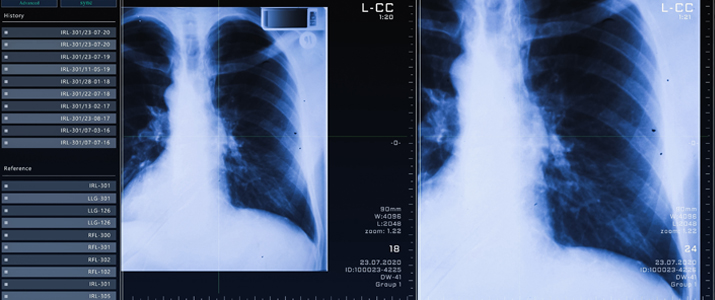

The Medical Imaging and Data Resource Center (MIDRC) is a collaboration of leading medical imaging organizations launched in August 2020 as part of NIBIB's response to the COVID-19 pandemic. MIDRC aims to develop a high-quality repository for medical images related to COVID-19 and associated clinical data, and develop and foster medical image-based artificial intelligence (AI) for use in the detection, diagnosis, prognosis, and monitoring of COVID-19.
NIBIB joined with the American College of Radiology (ACR), the Radiological Society of North America (RSNA), the American Association of Physicists in Medicine (AAPM), and the University of Chicago to create this free resource for researchers to use in the development of AI and deep learning tools and serve as a reference to enhance clinical recognition of COVID-19. Imaging data is contributed to MIDRC from multiple clinical sites throughout the country.
Learn more about MIDRC.
Access to the MIDRC data commons is now open.
MIDRC has received a Distinguished Achievement Award in the 2023 DataWorks! Prize. The prize is a partnership between the NIH Office of Data Science Strategy and the Federation of American Societies for Experimental Biology (FASEB) to incentivize effective practices and increase community engagement around data sharing and reuse. MIDRC was recognized for its collaboration to create a curated, diverse commons for medical imaging AI research and translation. All of MIDRC’s procedures, data models, data harmonization, annotation, and data management strategies are publicly available.
MIDRC lends medical imaging expertise to ARPA-H program
MIDRC was selected in September 2023 as one of several performers for the ARPA-H Biomedical Data Fabric (BDF) Toolbox. The ARPA-H BDF is an initiative to de-risk technologies for an easily deployable, multi-modal, multi-scale, connected data ecosystem for biomedical data. MIDRC will provide domain expertise and data commons technology development in medical imaging. MIDRC is funded by NIH NIBIB, co-led by investigators from the American Association of Physicists in Medicine (AAPM), the Radiological Society of North America (RSNA), and the American College of Radiology (ACR), hosted at the University of Chicago (MIDRC Central), and exists on the Gen3 data ecosystem.
ARPA-H is enlisting multiple performers who are experts in their fields to build components of the ARPA-H BDF Toolbox. MIDRC’s expertise stems from developing the repository in which MIDRC imaging data are harmonized and vetted by clinical, artificial intelligence (AI)/machine learning (ML), and data science domain experts and are aligned with a common data model. The public open data commons was created “at scale” and is interoperable with other data commons to enable multi-modal, multi-omics research as well as rigorous statistical evaluations. MIDRC also includes a user portal for cohort building and downloading, allowing for multiple re-uses of the data by various AI/ML developers for various specific tasks. Importantly, MIDRC has also produced various resources such as a metrology decision tree and a bias awareness tool for aiding in bias mitigation as well as multiple algorithms/software.
The ARPA-H BDF toolbox will help make research data easier and more reliable to use, reduce effort for data integration, and enable new capabilities and models that can be applied across disciplines and generalized across disease domains. “MIDRC’s involvement in the ARPA-H BDF Toolbox will include development and deployment of medical imaging data commons architectures and resources to support various diseases and applications for the toolbox.” said MIDRC principal investigator Maryellen L. Giger, PhD, the A.N. Pritzker Distinguished Service Professor of Radiology, Committee on Medical Physics at the University of Chicago.
For more on how you can get involved, go to ARPA-H BDF; for more on how you can submit and/or access data, go to MIDRC.
Announcements
Watch Dr. Bruce Tromberg's talk on Accelerating Innovation and Technology Development in IR and AI through Engineering-Medicine Partnerships.
- International Society for Optics and Photonics (SPIE)
- America Society for Neuroradiology (ASNR)
- American Institute of Ultrasound in Medicine (AIUM)
- Academy for Radiology and Biomedical Imaging Research
- Society of Imaging Informatics in Medicine (SIIM)
Outcomes
- >300,000 imaging studies collected
- >135,000 imaging studies released to the public
- 27 algorithms in development
- >450 data users
Related News & Events
As AI is deployed in clinical centers across the U.S., one important consideration is to assure that models are fair and perform equally across patient groups and populations. To better understand the fairness of medical imaging AI, researchers trained over 3,000 models spanning multiple model configurations, algorithms, and clinical tasks. Their analysis of these models reinforced some previous findings about bias in AI algorithms and uncovered new insights about deployment of models in diverse settings.
This interview with Maryellen Giger, PhD, delves into the creation of the MIDRC imaging repository, how its data can be used to develop and evaluate AI algorithms, ways that bias can be introduced—and potentially mitigated—in medical imaging models, and what the future may hold.
Researchers have found that AI models could accurately predict self-reported race in several types of medical images, suggesting that race information could be unknowingly incorporated into image analysis models.
MIDRC's June 2023 monthly seminar will focus on how MIDRC can help investigators satisfy the new NIH Data Management and Sharing Policy.
Presenting the medical imaging community with new tools and resources from MIDRC to facilitate rapid and flexible collection, AI research, and dissemination of imaging and associated data.
Virtual event: February 21, 2023 speaker: Dr. Paul Kinahan, University of Washington, on Curating the MIDRC collection of DICOM images for use in AI research.
A series of webinars about topics related to the Medical Imaging and Data Resource Center (MIDRC).



